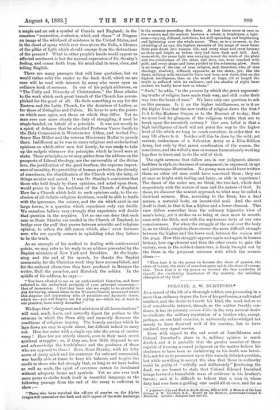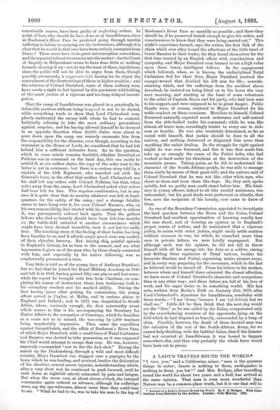COLONEL A. W. DURNFORD.*
As a record of the life of a thorough soldier, one possessing in a more than ordinary degree the love of his profession, a cultivated intellect, and the desire to benefit his kind, the work before us is of considerable interest, though, as the author frankly con- fesses, it has its primary raison d'eltre in the very natural desire to vindicate the military reputation of a brother who, except, perhaps, on one fatal occasion, is universally acknowledged not merely to have deserved well of his country, but to have rendered very signal service.
Even with regard to the sad event at Isandhlwana and Colonel Dnrnford's share in it, military opinion is much divided, and it is probable that the greater number of those capable of forming a sound judgment on the matter believe his obedience to have been as unfaltering as his death was heroic. It is not for us to pronounce upon this warmly-debated question, but while unwilling to accept the idea that those in authority could be guilty of " wilfully and deliberately" [traducing the dead, we are bound to state that Colonel Edward Durnford brings forward a formidable mass of evidence in his brother's favour ; and it is difficult to believe that a man to whom duty had ever been a guiding star could all at once, and for no • .4 Soldier's Lifs °ad Work to South Africa, 1872 to 1579. A Metatir of the Late Goleuet A. W. Lffirnford, U.E. Edited by his BrotLer, Lieutenant-Colonel E. Durnford. London : Eampeon Low and Co.
conceivable reason, have been guilty of neglecting orders. In point of fact, why should he have done so at Isandhlwana, since at Bushman's River Pass he preferred going through terrible suffering to failure in carrying out his instructions, although it is clear that he would in that case have been entirely exempted from blame ? There must have been great misconception somewhere, and the repeated refusals to examine into the matter—for the Court of Inquiry at Helpmakaar seems to have done little or nothing towards clearing it up—are, to say the least of them, injudicious, since the public will not be slow to argue from them, though possibly erroneously, a suppressio yeti, having for its object the concealment of the shortcomings of those in higher position ; and the relatives of Colonel Durnford, some of them military men, have surely a right to feel injured by this persistent withholding of the scant justice of a rigorous and too-long-delayed investi- gation.
That the camp of Isandhlwana was placed in a practically in- defensible position without being laagered is not to be denied, while everything tends to show that Lord Chelmsford com- pletely underrated the enemy with whom he had to contend, habitually refusing to take the most ordinary precautions against surprise; and his having allowed himself to be decoyed in an opposite direction when 20,000 Zulus were about to pour down upon the camp can scarcely exonerate him from the responsibility for the disaster, even though, according to his statement in the House of Lords, he considered that he had left behind him a sufficient defensive force. As to the question, which in some minds remains doubtful, whether Durnford or Pulleine was in command on the fatal day, this can easily be settled if, as our author states, the copy of the order sent to the latter is yet in existence ; but there is a curious story told by a captain of the 24th Regiment, who marched out with the General's force, to the effect that neither Lord Chelmsford nor his staff left any orders with Colonel Pulleine, but that, when miles away from the camp, Lord Chelmsford asked what orders had been left for him. This requires confirmation, but in any case it is quite clear that no anxiety whatever was felt at head- quarters for the safety of the camp ; and a strange fatality seems to have hung over it, for even Colonel Harness, who, on his own responsibility, had started with his contingent to relieve it, was peremptorily ordered back again. That the gallant fellows who died so bravely should have been left four months on the battle-field unburied is another circumstance which might have been deemed incredible, were it not but too sadly true. The touching story of the finding of their bodies has long been familiar to us, and it affords ample proof, were any needed, of their chivalric bravery. But leaving this, painful episode in England's history, let us turn to the memoir, and see what impression it gives us of the man who, by those closely connected with him, and especially by his native following, was so emphatically pronounced a hero.
Very little is told us of the young days of Anthony Durnford, but we find that he joined the Royal Military Academy in 1846 and left it in 1848, having gained fifty-one places and lost none; while the report he brought with him from Chatham, on com- pleting his course of instruction there, bore testimony both to his exemplary conduct and his marked ability. During the first twenty years after getting his commission, the young officer served in Ceylon, at Malta, and in various places in England and Ireland ; and in 1872 was despatched to South Africa, where, curiously enough, the first noteworthy event which occurs to him is his accompanying the Secretary for Native Affairs to the coronation of Cetewayo, which he describes us a scene not to be missed, the war-song by 5,000 warriors being wonderfully impressive. Then came the expedition against Langalibalele, and the affair of Bushman's River Pass, of which Major Durnford, with a small force of Natal Carbiniers and Basutos, was desired to take possession, as it was supposed the Chief would attempt to escape that way. He was, however, expressly commanded "not to fire the first shot." During the march up the Drakensberg, through a wild and most difficult country, Major Durnford was dragged over a precipice by the horse which he was leading, and received, besides the dislocation of his shoulder, several severe injuries, notwithstanding which, after a very short rest he continued to push forward, until be sank down at nightfall utterly exhausted by pain and fatigue. But when the moon rose, at about eleven o'clock, the intrepid commander again ordered an advance, although his sufferings were, say the eye-witnesses, almost more than they could bear to see. " What he had to do, was to take his men to the top of Bushman's River Pass as speedily as possible ; and there they should be, if he preserved breath enough to give his orders, and consciousness to know that they were being carried out." This night's experience formed, says the writer, the first link of the chain which ever after bound the affections of the little band of brave Basutos to their leader, for they found themselves for the first time treated by an English officer with consideration and sympathy, and Major Durnford soon learned to set a high value upon these brave, intelligent fellows. In the engagement which followed, when, as is known, the undisciplined Natal Carbiniers fled for their lives, Major Durnford received the assegai-wound that disabled his left arm for life ; notwith- standing which, and his sufferings from the accident above described, he insisted on being lifted on to his horse the very next morning, and starting at the head of some volunteers to the relief of Captain Boyes and his party, who had been sent to his support, and were supposed to be in great danger. Public thanks were, of course, rendered to Major Durnford for his noble conduct on these occasions. Merciless to himself, Colonel Durnford naturally expected much endurance and self-control from the able-bodied under his command ; while he was, like almost all brave men, exceedingly tender to every one in sick- ness or trouble. He was also resolutely determined, so far as rested with himself, that justice should be done to all the natives, and nothing distressed or disgusted him more than anything like unfair dealing. In the struggle for right against might he was ever foremost, and this it was that made him take up so strongly the cause of the Putini tribe, who had worked so hard under his directions at the destruction of the mountain passes. Taking pains, as he did, to understand the character of the South-African people, he was able to manage them easily by means of their good-will; and the natives said of Colonel Durnford that he was not like other white men, who shout at them and treat them like dogs. He, they said, spoke quietly, but no guilty man could stand before him. His kind- ness to young officers, indeed to all who needed assistance, was unbounded ; but his good deeds were performed so silently, that few, save the recipients of his bounty, ever came to know of them.
As one of the Boundary Commission appointed to investigate the land question between the Boers and the Zulus, Colonel Durnford had excellent opportunities of knowing exactly how the case stood, and of forming an opinion as to England's proper course of action ; and be maintained that a vigorous policy, in union with strict justice, might easily settle matters without recourse to war, for which, he remarked more than once in private letters, we were totally unprepared. But although such was his opinion, he did not fail to throw himself with all his energy into his duty as a soldier, raising and drilling three regiments of Natal natives, besides his favourite Basutos and Putini, organising native pioneer corps, and in every way preparing for the encounter, which to the last he believed would be staved off. From his letters to his mother, between whom and himself there subsisted the closest affection, we learn more of Colonel Durnford's character and occupations than in any other way ; and these letters are full of his love of work, and his eager desire to do something useful. His last note, written from Rorke's Drift on January 21st, 1879, after Lord Chelmsford's departure for Isandhlwana, concludes with these words,—" I am down,' because I am left behind, but we shall see." Little did he then think that the next day would see the " lion," as he was called by the Zulus, overpowered only by the overwhelming numbers of his opponents, lying on the field which he had disputed so bravely, surrounded by a heap of slain. Possibly, however, the death of these devoted men was the salvation of the rest of the South-African Army, for we cannot help thinking, with the faithful Jabez, that if the disaster had not occurred at Isandhlwana, it was bound to happen somewhere else, and then very probably the whole force would have been cut to pieces.



































 Previous page
Previous page